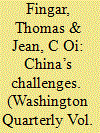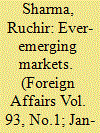|
|
|
Sort Order |
|
|
|
Items / Page
|
|
|
|
|
|
|
| Srl | Item |
| 1 |
ID:
172086


|
|
|
| 2 |
ID:
181882


|
|
|
|
|
| Summary/Abstract |
This study analyzes the rise of DC/EP (digital currency electronic payment) in China by proposing the concept of “recentralized authoritarian capitalism.” It first examines how recentralized authoritarian capitalism started in 2010 in the form of a recentralizing of regulations. After considering how the fintech firms have restructured their shareholding in response to the recentralizing regulations, I delineate how these firms further strengthen recentralized authoritarian capitalism, as exemplified by how Alipay has helped realize the Party’s plan to launch DC/EP.
|
|
|
|
|
|
|
|
|
|
|
|
|
|
|
|
| 3 |
ID:
126271


|
|
|
|
|
| Publication |
2014.
|
| Summary/Abstract |
In the middle of the last decade, the average growth rate in emerging markets hit over seven percent a year for the first time ever, and forecasters raced to hype the implications. China would soon surpass the United States as an economic power, they said, and India, with its vast population, or Vietnam, with its own spin on authoritarian capitalism, would be the next China. Searching for the political fallout, pundits predicted that Beijing would soon lead the new and rising bloc of the BRICs -- Brazil, Russia, India, and China -- to ultimate supremacy over the fading powers of the West. Suddenly, the race to coin the next hot acronym was on, and CIVETS (Colombia, Indonesia, Vietnam, Egypt, Turkey, and South Africa) emerged from the MIST (Mexico, Indonesia, South Korea, and Turkey).
|
|
|
|
|
|
|
|
|
|
|
|
|
|
|
|
| 4 |
ID:
189701


|
|
|
|
|
| Summary/Abstract |
After a deterioration of democratic conditions in Venezuela, in 2017 the United States intensified its sanctions imposed on the regime of Nicolás Maduro. The sanctions failed to topple the regime, but they accelerated the transformation of the Venezuelan economy. To counter the sanctions, Maduro carried out substantive economic policy changes, resulting in the emergence of a neo-patrimonial and authoritarian form of capitalism. In this new model, private ownership is the rule, and economic agents operate for profit. Yet there is frequent state intervention that denies individuals’ fundamental political and economic rights, and the purpose of laws and regulations is ensuring regime survival.
|
|
|
|
|
|
|
|
|
|
|
|
|
|
|
|
|
|
|
|
|